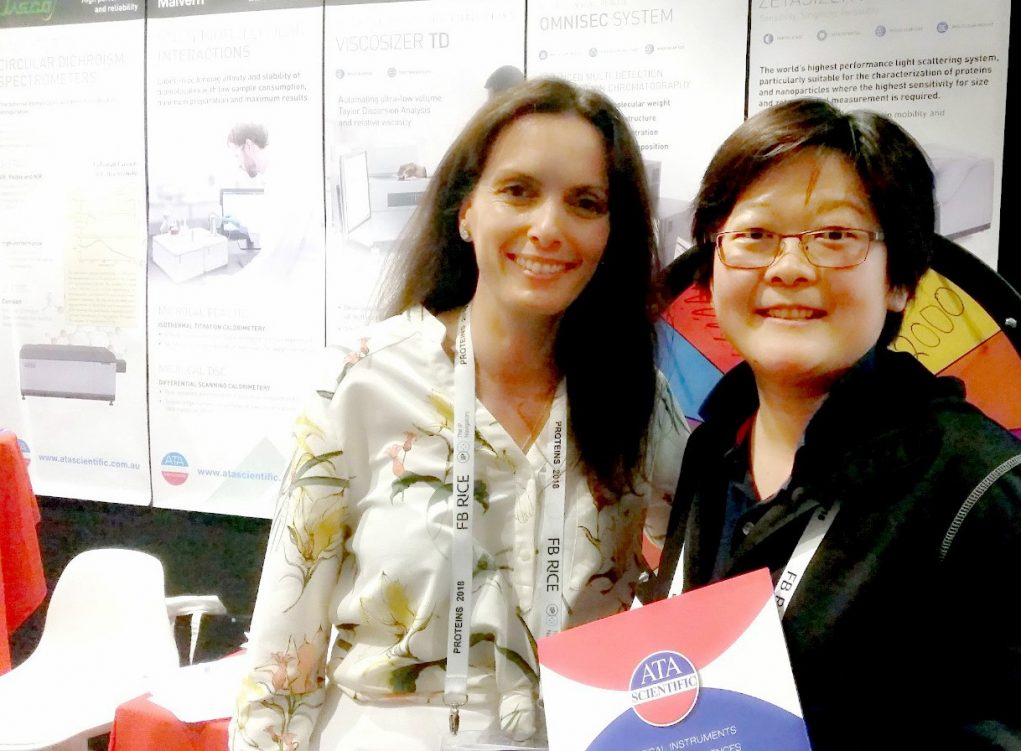ENCOURAGEMENT AWARD AUGUST 2018
ATA Scientific would like to thank all those that participated in our recent Encouragement Award promotion.
The topic of our latest competition focused on the strong link between cognitive behaviour and foods. While studies continue to show evidence that supports the idea that food can influence our thought processes, we asked our readers to consider their own experiences and whether particular foods had any influence on their ability to think and concentrate. Judging by the number of entries received this is certainly a hot topic, particularly for those addicted to coffee and chocolate – yes, you know who you are. Many chose to focus on the science of consuming certain foods and described the chemical pathways leading to changes in brain function. Others noted the social impact and the role food plays in the expression of cultural identity. We were delighted to receive so many high quality responses, all of which were deserving winners. Each entry was scored based on originality, relevance and level of entertainment.
OUR WINNERS
After much deliberation, three entries were selected to receive our award– first prize at $1500 and 2 runners up at $600 each.
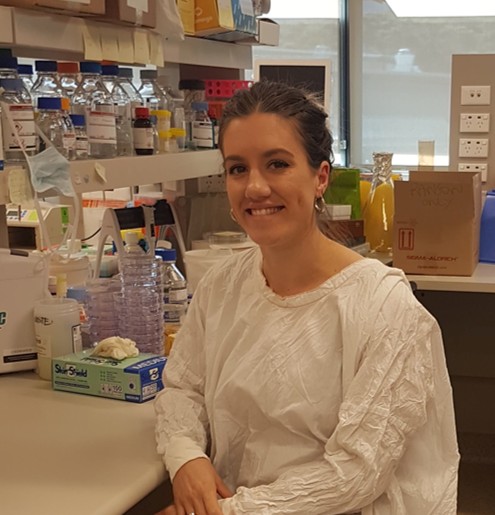 Congratulations to our first prize winner Samantha Wade, PhD candidate at the Targeted Cancer Therapeutics Laboratory, Illawarra Health and Medical Research Institute, University Of Wollongong, working under the supervision of Dr Kara L. Vine-Perrow.
Congratulations to our first prize winner Samantha Wade, PhD candidate at the Targeted Cancer Therapeutics Laboratory, Illawarra Health and Medical Research Institute, University Of Wollongong, working under the supervision of Dr Kara L. Vine-Perrow.
Samantha is a third year PhD student working on implantable drug delivery for pancreatic cancer. Her work involves re-purposing FDA approved materials and clinically used drugs to make dual drug eluting structures for implantation and local release in pancreatic tumours. Samantha works with a team of clinicians, material engineers and biologists to cover all aspects of the project, to fabricate implants that are targeted toward clinical use.
For Pancreatic cancer, systemic chemotherapy has been found to be largely ineffective and surgery is not an option for many people because most cases are diagnosed after the cancer has spread to other parts of the body. Samantha’s work on drug-loaded implants may offer patients a better chance of survival as they can be placed directly into the tumour to shrink it down to a size that can be surgically removed.
Samantha plans to use the award money to help cover the costs of attending the controlled release society annual meeting in Spain next year.
Congratulations to our runner up, Cameron McKnight.
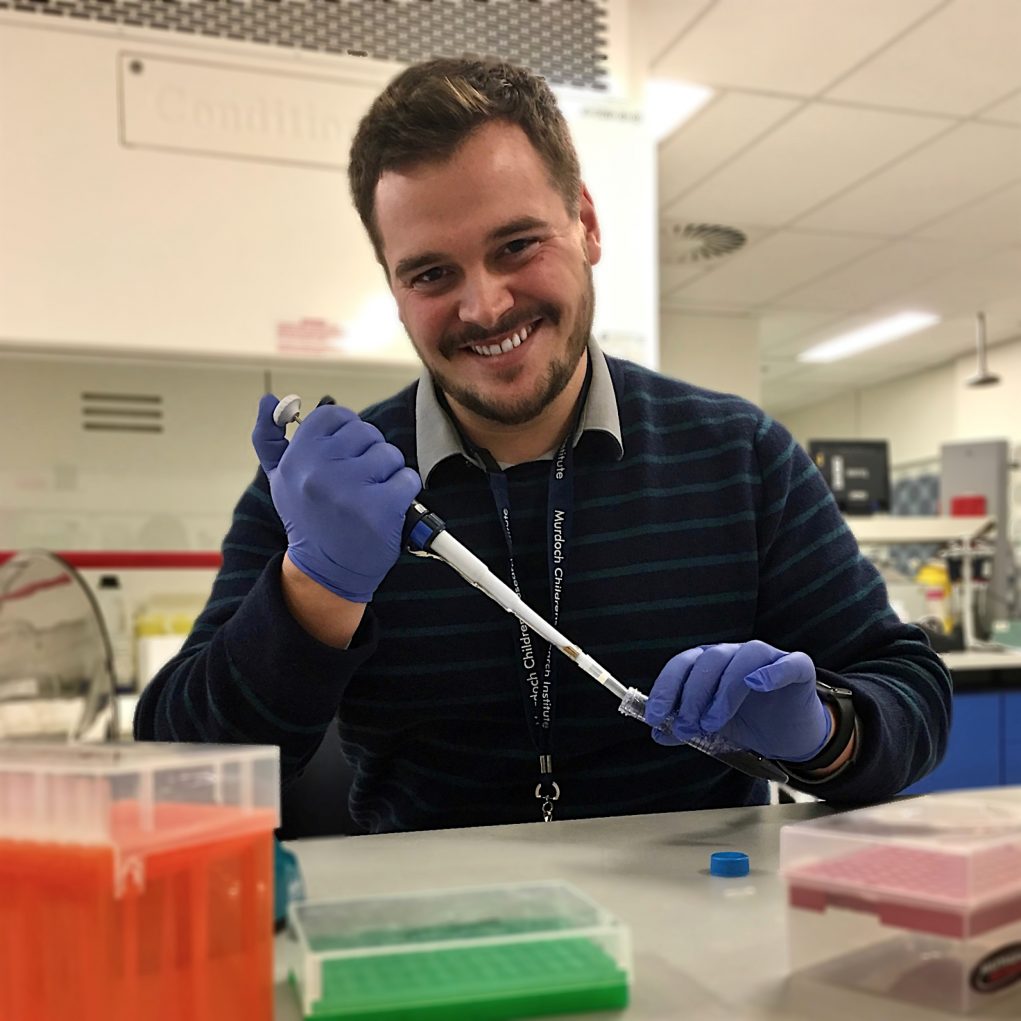
Cameron McKnight is a PhD student based at the Murdoch Children’s Research Institute (MCRI) in the lab of Prof. David Thorburn. His degree is through paediatrics at the University of Melbourne and he is supported by a Melbourne Research Scholarship. Cameron is also President of the Melbourne Children’s Campus Research Student Association and works with a group of volunteer students to organise networking and educational opportunities for all students studying on the children’s campus.
Working with his supervisor Ann Frazier, Cameron’s research focuses on childhood forms of mitochondrial disease, a group of complex inherited genetic disorders that primarily affect cellular energy production. He is developing pluripotent stem cell models to facilitate preclinical treatment studies and investigation of the underlying cellular mechanisms of disease. Although mitochondrial disease affects approximately 1 in 5000 live births, there is currently no known cures or treatments, a result of the clinical and genetic heterogeneity of the disorders. Still, a number of agents show therapeutic promise. The ultimate goal of Cameron’s project is to identify a potential treatment option using the clinically affected cell types by generating them in culture from his pluripotent stem cell models.
“This award will allow me to present my research at two discipline specific conferences this year, Australian Functional Genomics Conference in September and AussieMit in November, providing me the opportunity to get some valuable input from experts in fields. These conferences are also a great chance to network and potentially foster collaborations that could take my project to the next level! Post PhD, I hope to find a postdoctoral fellowship in stem cell or mitochondrial research. Having already moved from Canada I hope to be able to remain in Melbourne, but I am open to moving across the globe again short-term in order to develop some important long-term connections”.
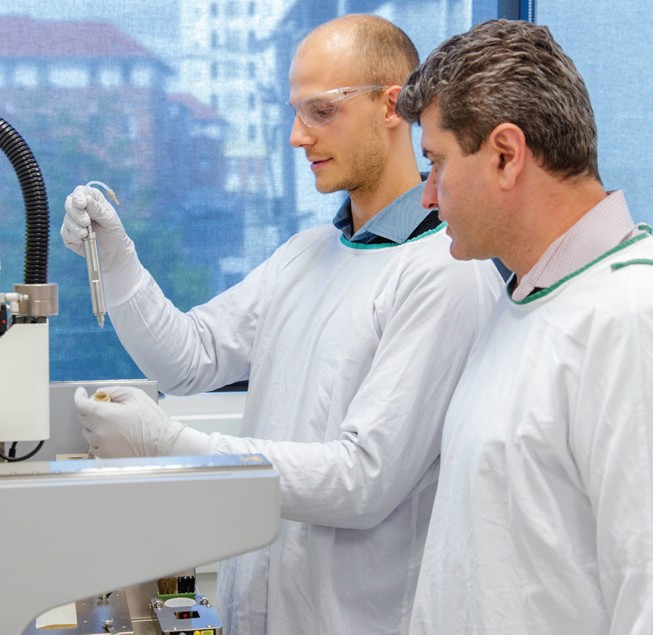 Congratulations to our runner up, Dr Michal Bartnikowski, a Postdoctoral Research Fellow from the School of Dentistry, at The University of Queensland. Michal is currently working with supervisor Professor Sašo Ivanovski on the development of 3D printed scaffolds for bone and periodontal regeneration.
Congratulations to our runner up, Dr Michal Bartnikowski, a Postdoctoral Research Fellow from the School of Dentistry, at The University of Queensland. Michal is currently working with supervisor Professor Sašo Ivanovski on the development of 3D printed scaffolds for bone and periodontal regeneration.
Michal’s work focuses on the development and clinical translation of custom biodegradable tissue engineered scaffold implants for bone regeneration of orofacial defects. These implants are made to fit individual patient’s geometries, and form a supportive structure to help the growth and development of bony tissue. Over the next few years, Michal aims to take a suite of tissue engineering products to the market, delivering affordable custom tissue regeneration solutions to patients in Australia.
Michal will use this award to help fund his trip to Kyoto, Japan this year, where he will present some of his work at the Tissue Engineering and Regenerative Medicine International Society (TERMIS) World Congress 2018 conference.
We would like to thank all those that participated. The final Encouragement Award for 2018 will be posted on our website soon.
For more information or to stay informed of other upcoming promotions please ‘Like us” on Facebook or contact us.
Contact usENCOURAGEMENT AWARD APRIL 2018
ATA Scientific would like to thank all those that participated in our April 2018 Encouragement Award promotion.
The topic of our latest competition focused on the future of scientific conferences and secondments and whether they are still needed with access to publications and information now fast and cheap over the internet. While presenting at scientific conferences can be an enjoyable and rewarding experience, the question invited readers to consider whether the money spent on these events could be better used on underfunded projects. The dilemma of attending scientific conferences or not can be intensified with the prospect of travelling to exotic locations or meeting famous Nobel Laureates. Overall, it came to no surprise that the social aspect and collaborative, scientific interaction that results from attending these events resonated with many for their support.
We were pleased to receive such a diverse range of high quality responses, all of which were deserving winners. Each entry was scored based on originality, relevance and level of entertainment.
OUR WINNERS
After much deliberation, three entries were selected to receive our award– first prize at $1500 and 2 runners up at $600 each.
Congratulations to our first prize winner Gabrielle McClymont, Masters student at the School of Life and Environmental Sciences, University of Sydney and works under the supervision of Professor Jacqui Matthews.
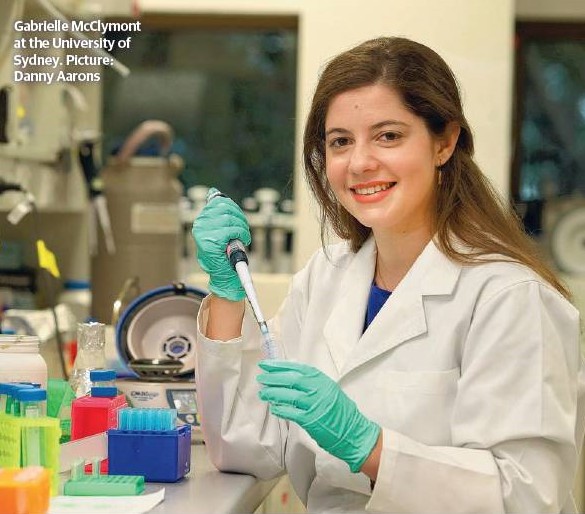 Gabrielle is researching novel α-helical peptide inhibitors of breast cancer oncogene LMO4. She has been working to redesign the peptide protein interface of LMO4 by replacing the traditional β-strand binding partners with novel inhibitory α-helical ones and designing a high throughput screening mechanism to identify these peptides. Inhibitors of LMO4 are a method to understand LMO4 mediated tumour progression and possible therapeutic precursors.
Gabrielle is researching novel α-helical peptide inhibitors of breast cancer oncogene LMO4. She has been working to redesign the peptide protein interface of LMO4 by replacing the traditional β-strand binding partners with novel inhibitory α-helical ones and designing a high throughput screening mechanism to identify these peptides. Inhibitors of LMO4 are a method to understand LMO4 mediated tumour progression and possible therapeutic precursors.
Gabrielle has recently won the Gates Cambridge Scholarship to undertake her PhD in Biochemistry at Cambridge University. Her PhD with Professor Nick Gay will elucidate the molecular mechanisms of inflammatory signal transduction in the innate immune system. Focusing on understanding the structure, function, kinetics and stoichiometry of TLR4 mediated inflammation with has been implicated in viral haemorrhagic fevers (end stage of disease such as Ebola and Dengue) and Sepsis. This research will provide the crucial molecular structure from which new therapeutics targeting severe inflammation can be developed.
“My life aim is to improve humanity through scientific endeavour. At the age of 11, I met Dr Takyama an eminent HIV researcher who inspired me to develop my scientific curiosity; years later volunteering at St Vincent de Paul, I observed my small services improve lives. This motivated my desire to use scientific research to magnify my contribution and advance the welfare of humanity. I will achieve this through my two interests, science and policy; utilising medical research and implementation in public policy with industrial collaboration to maximise the benefits globally”.
Gabrielle graduated from the University of Sydney Bachelor Advanced Science Arts, 1st class honours, Biochemistry, Government & International Relations. She is a finalist at the World, Asia-Pacific, Australasian Women’s and Australian University Debating Championships and Vice-President of the Politics Society and Society for Molecular Biologists.
Gabrielle plans to use the award money to help cover the costs of undertaking her PhD at Cambridge and in particular to attend conferences in Europe.
Congratulations to our runner up, Kristel Cahyadi Tjandra, third year PhD Candidate at CBNS: ARC Centre of Excellence in Convergent Bio-Nano Science and Technology, University of New South Wales under the supervision of A/Prof. Pall Thordarson. Given the interdisciplinary nature of her project, Kristel works with two diverse teams from the School of Chemistry (Thordarson Group) and Children’s Cancer Institute.
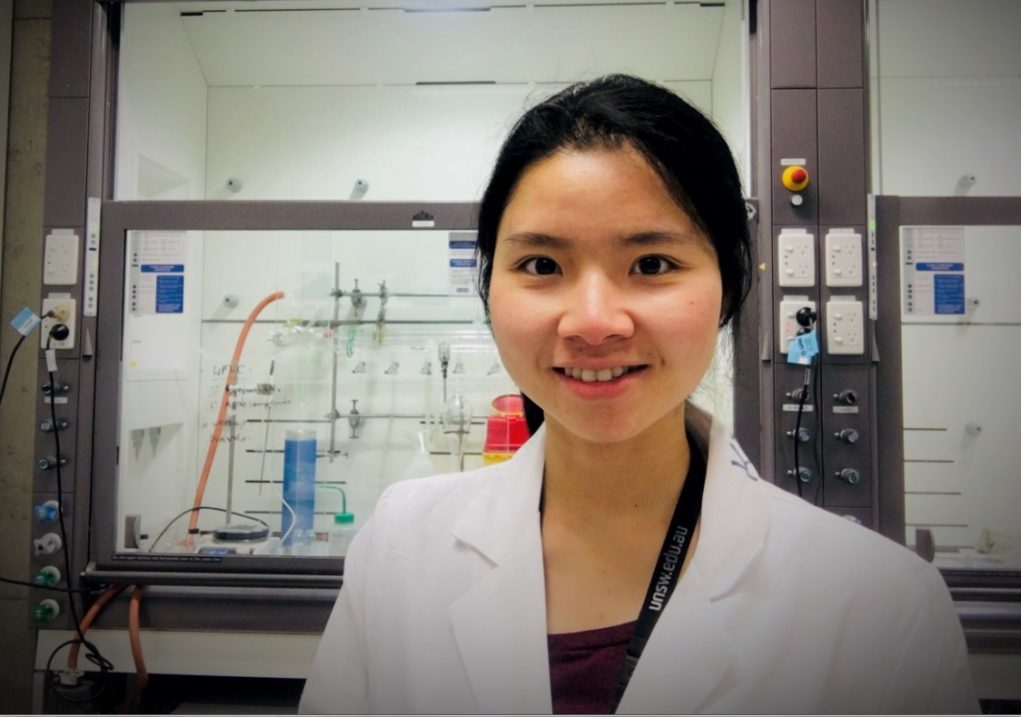 Kristel’s research is focused on the study of peptide-based drug delivery systems for targeted cancer treatment. Peptides are short chains of amino acids, often a part of a protein unit that has particular function inside the body. Her research objective is to design, synthesise and investigate the pharmacokinetics of peptide-based drug delivery systems, including the way they are taken up and react in the body, in order to develop drug-delivery systems that could target cancer cells in a specific manner.
Kristel’s research is focused on the study of peptide-based drug delivery systems for targeted cancer treatment. Peptides are short chains of amino acids, often a part of a protein unit that has particular function inside the body. Her research objective is to design, synthesise and investigate the pharmacokinetics of peptide-based drug delivery systems, including the way they are taken up and react in the body, in order to develop drug-delivery systems that could target cancer cells in a specific manner.
Kristel plans to use her prize money to travel and attend the European Molecular Biology Lab (EMBL) Chemical Biology Workshop 2018 in Heidelberg, Germany, 29 Aug – 1 Sep 2018.
“The award, which will contribute towards my attendance at EMBL Chemical Biology Workshop 2018, will give me the opportunity to engage with researchers working in the interface between Chemistry and Biology with a wide range of expertise. The opportunity to learn from other experts will hopefully spur new ideas and facilitate future collaborations”.
Kristel’s career goal is to work in the pharmaceutical industry and to keep pursuing her passion in the area of drug discovery and development. “I think that this area of pharmaceutical science will continue to have a huge impact in the society and that the technology we now have could help advance the field immensely”.
Congratulations to our runner up, Amy Wilson, from the Hudson Institute of Medical Research, Centre for Cancer Research, in Clayton, Victoria.
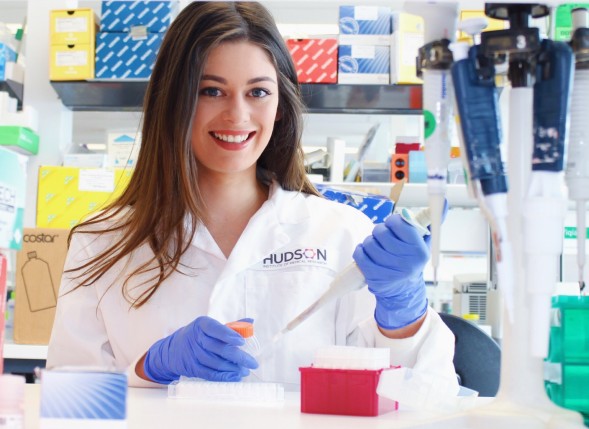 Amy is a third year PhD Student in the Ovarian Cancer Biomarkers laboratory at the Hudson Institute of Medical Research, under joint supervision of Dr. Andrew Stephens and Prof. Magdalena Plebanksi.
Amy is a third year PhD Student in the Ovarian Cancer Biomarkers laboratory at the Hudson Institute of Medical Research, under joint supervision of Dr. Andrew Stephens and Prof. Magdalena Plebanksi.
Amy’s PhD research is focused on re-activating the immune system to more effectively treat ovarian cancers. Often, ovarian tumours are hidden from the immune system via secretion of certain proteins, and this can lead to chemo-resistance. Amy’s research involves the re-purposing of an already clinically approved drug in combination with current therapies in order to reinvigorate the anti-tumour immune response.
Amy plans to use the award to attend the Australasian Society for Biochemistry and Molecular Biology ComBio 2018 conference being held in Sydney from 23-26 September 2018.
“This award will allow me to present my research to leading scientists to gain valuable feedback, and to establish a strong scientific network with esteemed researchers from various fields. After my PhD, my goal is work somewhere internationally; where I can learn, share my knowledge and skills, and form collaborations”.
We would like to thank all those that participated. The next Encouragement Award will be posted on our website in May 2018.
For more information or to stay informed of other upcoming promotions please ‘Like us” on Facebook or contact us.
Contact usSPIN to WIN at LORNE PROTEINS 2018
Our annual ‘SPIN TO WIN” Young Scientist award was once again a very exciting event during the 43rd Lorne Protein Structure and Function conference (4-8 Feb 2018). Students and academic staff were invited to spin the ATA wheel to win a number of different prizes which included the main prize on the board – our $2000 Young Scientist Award. A number of participants progressed through to the final round which saw the exhibition hall light up with great energy and excitement. The audience followed in anticipation until finally the winner was announced!
Congratulations to Dr Naomi Ling, Senior Researcher at St Vincent’s Institute Medical Research – winner of the $2000 Travel Award ‘Spin to Win’ Prize!
Naomi kindly nominated Toby Dite as the recipient of the award as per the conditions. The ATA Scientific young scientist award is open to PhD candidates and scientists aged 30 years or younger. By setting an age limit we give early career scientists access to financial assistance to enable them to collaborate with peers at scientific meetings such as the Lorne Proteins conference, and to launch their careers within their field of study.
Toby is in the final stages of his PhD project, with supervisors Dr. Jon Oakhill and Prof. Bruce Kemp at St Vincent’s Institute of Medical Research, through the University of Melbourne. Toby is investigating post-translational modifications of the energy sensing kinase AMP-Activated Protein Kinase (AMPK), and how this relates to drug activation/inhibition of AMPK pathways. This involves the feedback of several pathways on AMPK, leading to phosphorylation of critical residues involved in drug sensitivity. To delineate direct and indirect drug activation of AMPK, Toby’s research utilises mass spectrometric analysis of metabolites alongside other methods such as western blotting. Toby’s thesis involves the identification of new pathways involved in AMPK regulation, and the development of new methods of measuring AMPK activation/inhibition. Toby hopes to stay in the field of biochemistry, specifically investigating kinase signalling pathways into the future.
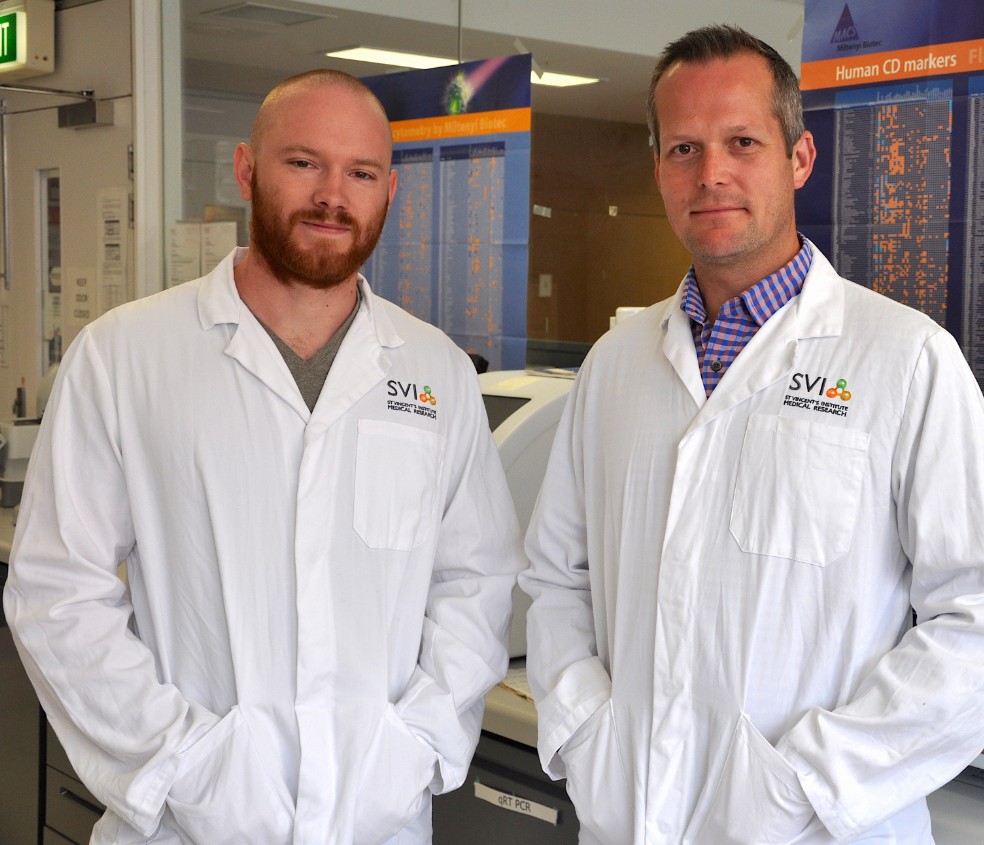
“A highlight of my PhD so far has been my first author publication “The Autophagy Initiator ULK1 sensitizes AMPK to Allosteric Drugs” in Nature Communications last year. “
Toby would like to use his award to attend the AMPK conference, from mechanisms to new therapies, 30 September to 4 October this year, in Canada.
The SPIN to WIN award is part of the ATA Scientific Encouragement award program that started in 2011. The intent is to provide scientists access to financial assistance to enable them to collaborate with peers at scientific meetings and to launch their careers within their field of study. The awards are run at least four times a year which has so far awarded 53 winners from multiple Universities and research organisations around Australia and New Zealand. We plan to continue posting these awards into the future and encourage all students to enter. For all previous winners please visit our website here.
For more information regarding our award or to enter the next promotion contact us or visit our webpage at www.atascientific.com.au/awards-events-training/
Contact usENCOURAGEMENT AWARD, NOVEMBER 2017
ATA Scientific would like to thank all those that participated in our November 2017 Encouragement Award promotion.
The topic of our latest competition was focused the science of de-extinction, the concept that we can bring back to life species that have gone extinct through cloning and genetic manipulation. The question examined the potential benefits and dangers raised by the reintroduction of extinct species. Those who favoured de-extinction chose to focus their entry on the effects of recent human activity and climate change as a moral reason to support the process. Several discussed the possibility of reconstructing and testing extinct genes for novel properties in the pursuit of developing new drugs for presently incurable diseases. Reanimation was also suggested as a way of helping currently endangered species by restoring lost genetic diversity. Aside from these and other obvious benefits, the potential dangers seemed to overwhelm many particularly those familiar with the vivid dinosaur scenes showcased in the movie “Jurassic Park”.
We were pleased to receive such a diverse range of high quality responses, all of which were deserving winners. Each entry was scored based on originality, relevance and level of entertainment.
OUR WINNERS
After much deliberation, three entries were selected to receive our award– first prize at $1500 and 2 runners up at $600 each.
Congratulations to our first prize winner, Shravanti Joshi, a final year PhD student at the Centre for Advanced Materials and Industrial Chemistry (CAMIC), RMIT University. Shravanti works under the supervision of Dr Samuel J Ippolito, and Dr Ylias Sabri, School of Science at RMIT University.
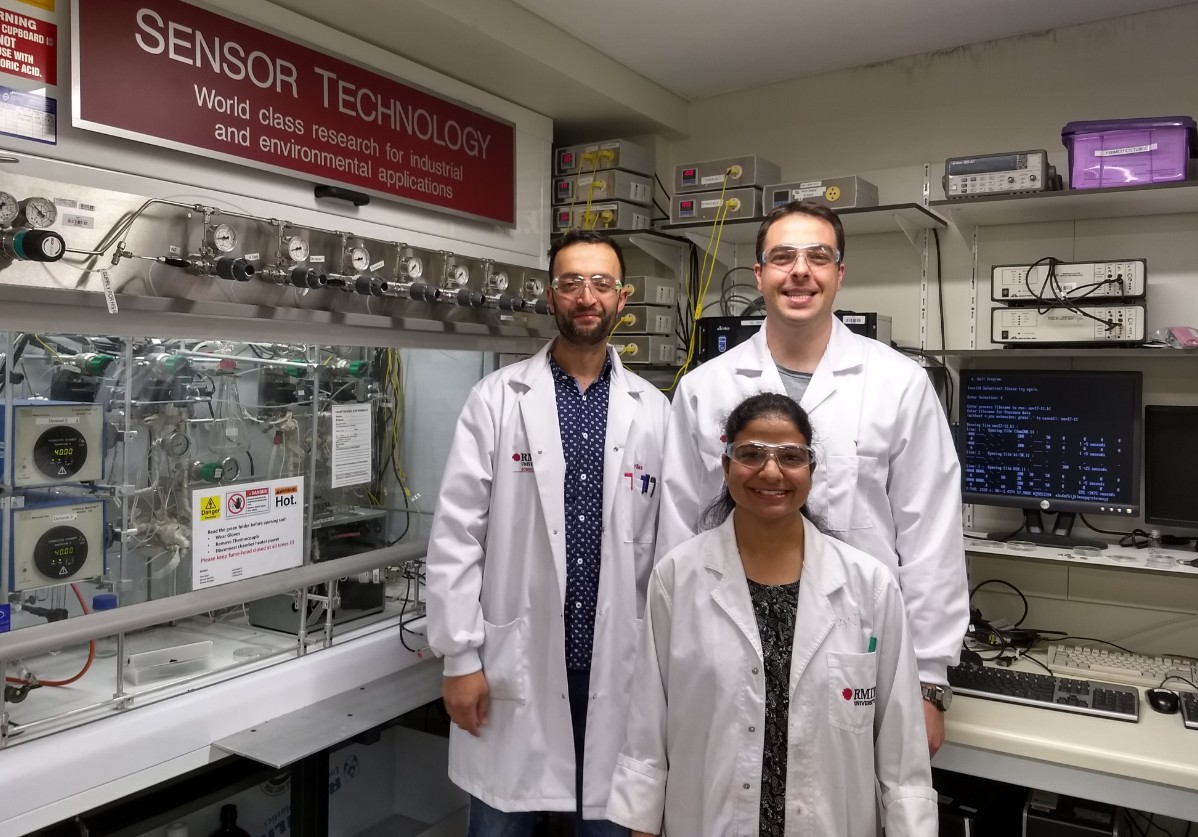
Shravanti has recently completed her doctoral work at the Mercury Laboratory, CAMIC. Her research primarily dealt with synthesis of defect engineered hierarchical nanomaterials for ultra-sensitive and selective CO2 detection. From the environmental monitoring perspective, selective CO2 detection is imperative as it is widely recognised as an occupational hazard, toxic contaminant and strong asphyxiant. However, its accurate monitoring still remains a formidable task owing to its chemically inert nature. During her PhD candidature, Shravanti demonstrated a high level of achievement with 6 peer-reviewed first author articles in respected journals such as Journal of Materials Chemistry A, ACS Applied Materials & Interfaces etc.
“It’s definitely motivating to receive such encouragement award for which I’m grateful to ATA Scientific Instruments for extending strong support”.
Shravanti plans to use the award money to attend the International Conference on Nanoscience and Nanotechnology (ICONN 2018), being held from 29 Jan-2 Feb at the University of Wollongong. Shravanti plans to present an invited lecture entitled “Prolated BaTiO3 spheroids decorated with Ag@CaO as Reliable CO2 Gas Sensitive Layer”.
“ICONN 2018 will be a perfect international platform for an early career researcher like me to showcase achievements in the field of chemical sensing to my peers and collaborators around the world. This journey from a novice mechanical engineer to a confident material scientist further motivates me to continue with germane work that will produce invaluable insights on how to use smart nanomaterials innovatively for competitive lab-on chip technologies in the field of environmental remediation and subsequent challenges for practical applications”.
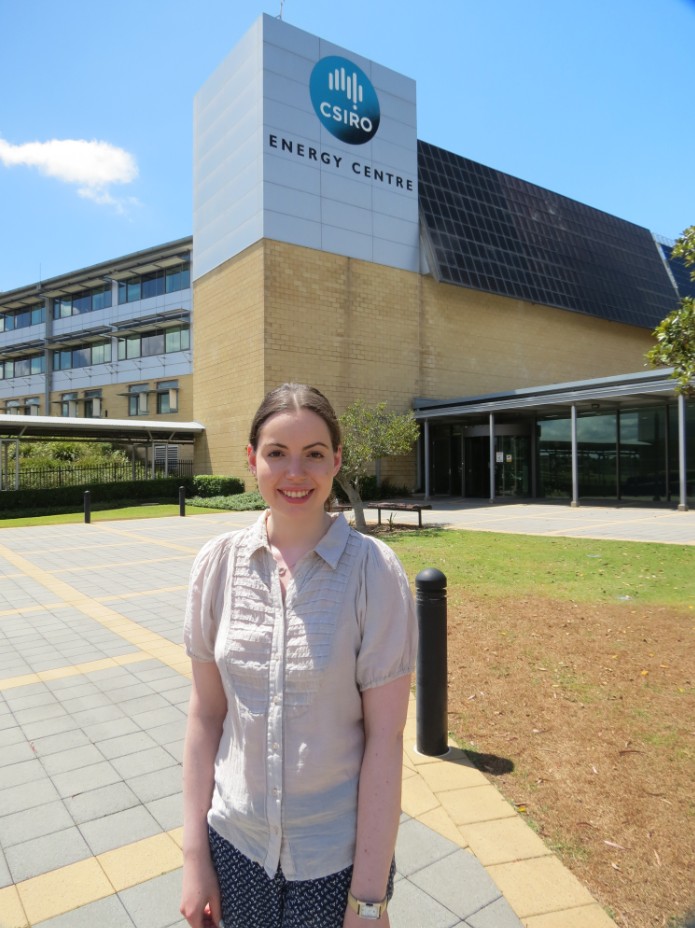 Congratulations to our runner up, Larissa Fedunik, second year Chemistry PhD student at the University of Newcastle under the supervision of Professor Scott Donne and Dr Alicia Bayon at CSIRO Energy.
Congratulations to our runner up, Larissa Fedunik, second year Chemistry PhD student at the University of Newcastle under the supervision of Professor Scott Donne and Dr Alicia Bayon at CSIRO Energy.
Larissa’s PhD research is focused on thermochemical energy storage (TCES) for solar thermal applications. TCES has excellent potential because of its high energy storage density and the fact that it uses inexpensive materials such as calcium carbonate (limestone). Larissa is working on the synthesis and laboratory-scale demonstration of enhanced materials to increase efficiency and cyclability.
“Solar thermal energy generation and storage can provide Australia with clean, inexpensive energy and I hope to raise public awareness about it – everybody has heard of PV but solar thermal doesn’t get nearly enough attention!”
“I plan to use the award to attend a chemistry conference with a strong focus on renewable energy technologies or even the Public Communication of Science and Technology (PCST) Conference. I think communication between scientists, government and industry is essential”.
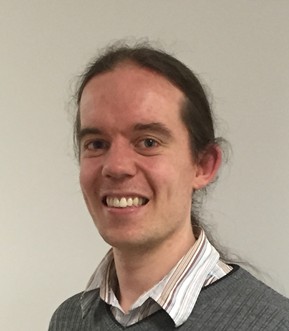 Congratulations to our runner up, Stephen Bernard Drane, from Monash Institute of Pharmaceutical Sciences studying under the supervision of Professor Raymond Norton.
Congratulations to our runner up, Stephen Bernard Drane, from Monash Institute of Pharmaceutical Sciences studying under the supervision of Professor Raymond Norton.
Stephen is currently in the final throes of completing his Masters thesis, detailing work undertaken to evaluate peptide toxins from animal venom for possible therapeutic applications.
“My true goal is to combine my love for science with my equally ardent love for performance, and forge a career making science interesting and accessible for society at large”.
Stephen plans to use the award to attend the Public Communication of Science and Technology 2018 conference, to be held in Dunedin NZ in April. This is an international science communication conference, where Stephen plans to network with people in the industry and learn the most effective strategies for getting the wider public engaged with the ongoing endeavour of scientific discovery.
We would like to thank all those that participated. The next Encouragement Award will be posted on our website in 2018.
For more information or to stay informed of other upcoming promotions please ‘Like us” on Facebook or contact us.
Contact usENCOURAGEMENT AWARD, AUGUST 2017
ATA Scientific would like to thank all those that participated in our August 2017 Encouragement Award promotion.
The topic of our latest competition was focused on Malware such as Petya and WannaCry and ways we can protect our computer systems by taking lessons from the way nature deals with threats. To our delight, we received a large number of entries which was eventually whittled down to just 9 finalists. Each was scored based on originality, relevance and level of entertainment. Three entries were selected to receive our award– first prize at $1500 and 2 runners up at $600 each.
OUR WINNERS
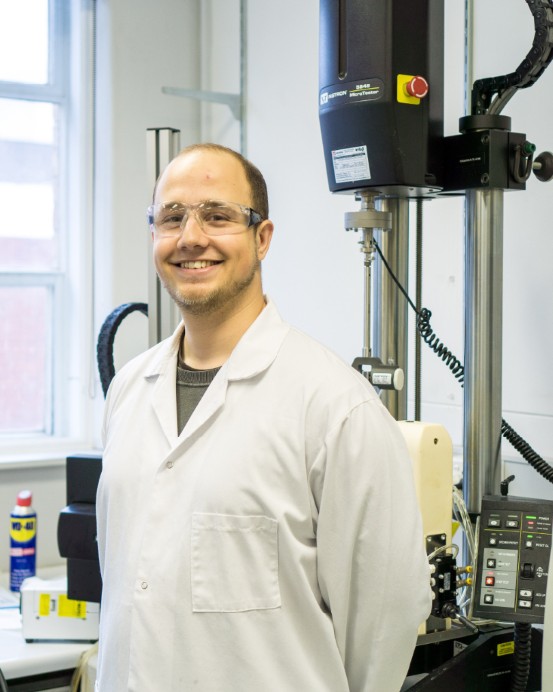
Congratulations to our first prize winner, Samuel Pinches, is a third year PhD student in the department of Chemical and Biomolecular Engineering at the University of Melbourne, in the Ceramics and Minerals Processing Group with Professor George Franks.
“I have a real passion for learning how things are made, and I have found a keen interest in understanding the relationship between the unique properties of a material, the processes that can shape and change the material, and the applications that this combination can enable”.
Samuel’s research is focused on examining a new process to potentially enable the production of complex shaped ceramics, more efficiently. The group is examining a modified freeze-casting process in order to produce dense near-net shaped ceramic parts. The goal of this new process is to reduce the time and cost per part, in order to improve the feasibility of mass producing complex-shaped ceramic parts. Previous work has identified that this process produces parts with major flaws, so Samuel’s work has focused on studying each step of the process, in order to develop a clearer understanding of what is occurring, and to identify the cause of defects observed in samples. By working to apply the knowledge that is gained, the group can minimise the flaws and optimise the product quality, as well as identify any limitations that remain for using this process in real world applications.
Having studied chemical engineering, Samuel’s goal is to continue finding engineering opportunities for solving multidisciplinary problems, such as the challenges associated with taking novel materials and processes out of the lab, and bringing them into real-world applications.
“I am grateful for the support from ATA Scientific with this award, and this award will enable me to attend the 1st Asia-Pacific International Conference on Additive Manufacturing (APICAM2017) in December this year. I would encourage current students to keep an eye out for future awards!”
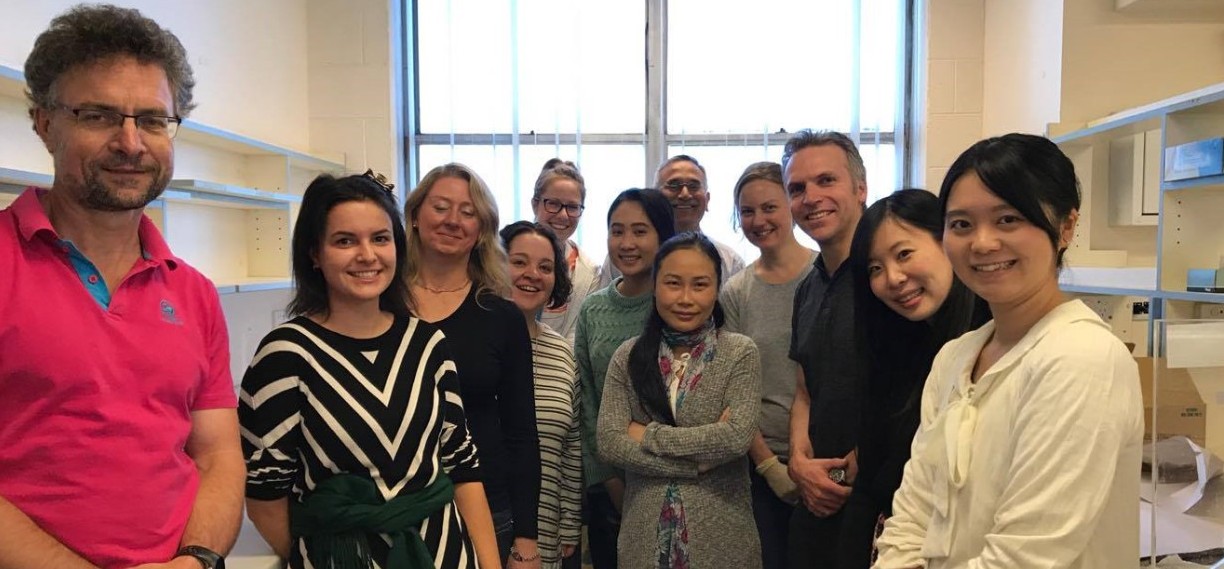
Congratulations to our runner up, Atma Maria Ivancevic, a Postdoctoral Researcher at The University of Adelaide, Robinson Research Institute, Adelaide Medical School, Neurogenetics. Atma works under the supervision of Professor Jozef Gecz, at The University of Adelaide.
Atma’s current project is focused on investigating structural variations in the human genome (e.g. deletions, duplications, mobile element insertions) and understanding their role in neurological disorders such as epilepsy and cerebral palsy. Using whole genome sequencing data and massively parallel computing infrastructure, Atma’s work is focused on design and optimizing pipelines to identify pathogenic variants. Ultimately, this will help to define the diverse spectrum of genomic rearrangements that contributes to disease risk in the human population.
“As an early career researcher, one of the biggest challenges is getting noticed at an international level in the scientific community”.
Atma plans to use her award to attend a prestigious international conference (e.g. 2018 Human Genome Meeting in Japan) that will allow her to network with the best genomics labs in the world. This is particularly important considering Atma’s immediate career plans are to move overseas for a postdoc next year in 2018.
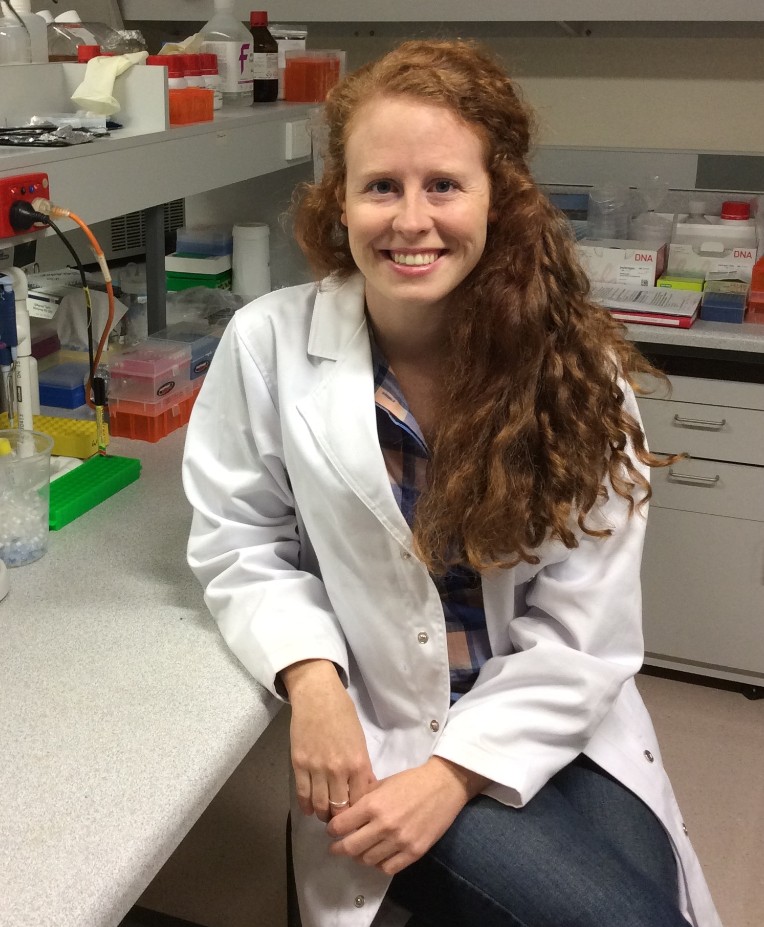
Congratulations to our runner up, Dr Kendall Corbin, Post Doctoral Research Fellow in the College of Medicine and Public Health at Flinders University, South Australia. Kendall works in the Medical Biotechnology Department headed by Professor Chris Franco.
Her research focuses on finding novel and innovative ways to utilize agro-industrial waste and low-value marine resources for biofuel or medical applications. Interest in capitalising on these underutilised resources is attributed to the unique biological properties of extractable carbohydrates and bioactive compounds. Furthermore, the use of these residues is considered to be more socially and environmentally responsible than using edible portions of food crops.
One limitation that currently undermines the practicality of using waste biomass sources is the complexity of the material (more specifically the plant cell wall). Plant-based bioresources consists of a heterogeneous matrix of carbohydrates, polyphenol polymers and proteins that are difficult to separate into discrete, usable components without using toxic chemicals or high-energy inputs. To circumvent these limitations my research explores the potential to incorporate green chemistry approaches as a sustainable alternative for biomass processing. Kendall hopes that this innovative multi-facet approach will set the scene for further advancements in the field and ultimately our ability to convert trash (agricultural waste) into treasure (high-value products).
Kendall plans to use this award to attend one of the workshops/conferences organised by the European Molecular Biology Laboratory (EMBL). One of the key conferences of interest is Microfluidics 2018: New Technologies and Applications in Biology, Biochemistry and Single-Cell Analysis (Heidelberg, Germany).
We would like to thank all those that participated. The next Encouragement Award will be posted on our website soon.
For more information or to stay informed of other upcoming promotions please ‘Like us” on Facebook or contact us.
Contact usENCOURAGEMENT AWARD, MAY 2017
ATA Scientific would like to thank all those that participated in our May 2017 Encouragement Award.
The topic of our latest competition was focused climate change and how we can develop innovations to minimise the negative effects. Selecting just three winners from the huge number of entries received was not an easy task. After carefully reviewing each one, we soon realised they were all worthy of the prize. While many chose to discuss mitigation strategies including reducing fossil fuel use, planting more trees, reducing waste, others considered quite novel and innovative solutions to achieve significant greenhouse gas reductions. It’s clear there is no single solution to global warming, however the choices we make in our day-to-day life — how we get around, what we eat, how we live — play a major role. Thank you to all those that participated in our competition and sent in their entries.
If you would like to get involved in reducing greenhouse gas emissions too, contact your political representatives and tell them you want immediate action on climate change.
OUR WINNERS
Three entries were selected to receive our award– first prize at $1500 and 2 runners up at $600 each.
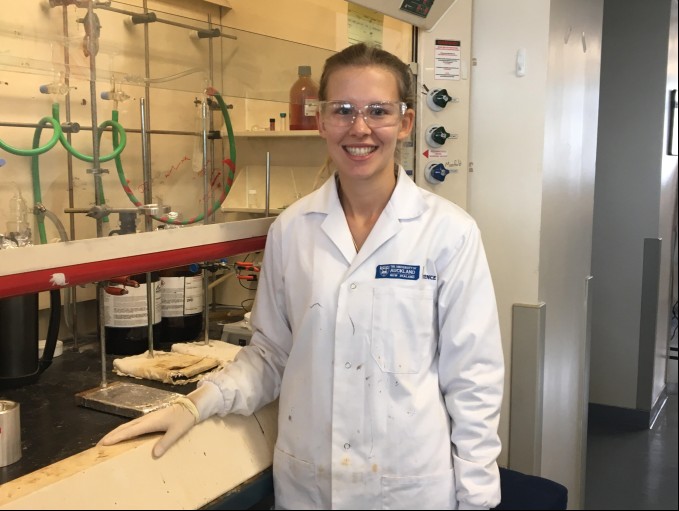
Congratulations to our first prize winner, Magdalena Kohut, PhD student at the University of Auckland studying Organic Synthetic Chemistry. Magdalena works under the supervision of Associate Professor Jonathan Sperry. Her research is mainly focused on the development of iridium-catalysed C-H activation methodology and its applications in natural product synthesis.
Magdalena recently completed her Master’s project in the labs of GlaxoSmithKline, a major pharmaceutical company. A summer internship in a medicinal chemistry group enabled her to understand the processes involved in drug discovery including the decision pathways used to assess and develop promising candidates. Through this experience, Magdalena was able to explore novel chemical space to further efforts towards a first-in-class therapy for an aggressive cancer cell line.
“My present research interests lie in small molecule synthesis with potential medicinally important activity. Throughout my future career as a broad goal I am determined to carry on searching for applications of science to benefit society, at the same time addressing the challenges of sustainable research and development. I seek a future as part of the bio-economy and am keen to learn about how academic research is commercialised”
Magdalena will use the award to help fund her travel and participation as one of 100 Leaders of Tomorrow at the Gap Summit conference at Georgetown University on 6th – 10th June 2017. The Gap Summit is a prestigious invite-only conference from which Magdalena was selected from a large pool of applicants. It will allow her contribute to discussions regarding the current global bio-economy and the grand challenges within the biotech industry. Listening to and meeting biotech CEOs, policy makers and research pioneers will give her a new perspective to her current and future work.
To read more about this conference visit http://dev.globalbiotechrevolution.com/events/gapsummit-2017/
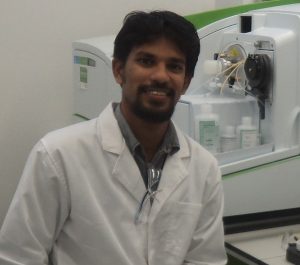 Congratulations to our runner up, Hasintha Wijesekara, a PhD student to the Global Centre for Environmental Remediation (GCER), The University of Newcastle. Hasintha works under the supervision of Professor Nanthi Bolan, Professor of Environmental Chemistry at The University of Newcastle.
Congratulations to our runner up, Hasintha Wijesekara, a PhD student to the Global Centre for Environmental Remediation (GCER), The University of Newcastle. Hasintha works under the supervision of Professor Nanthi Bolan, Professor of Environmental Chemistry at The University of Newcastle.
His research is focused on understanding the biogeochemical mechanisms of biosolids application on carbon sequestration in soils. He uses biosolids which is treated sewage sludge to limit greenhouse gas emission and enhance soil carbon sequestration.
In his research, he has been able to modify biosolids with an effective nano-scale stabilisation process with two industrial waste materials: Fly Ash from coal fired power stations and Red Mud from Bauxite refining. These industrial wastes contain certain types of nano-clay minerals. When mixed with biosolids, these tiny minerals bond strongly with carbon through a series of strong chemical and physical associations, protecting it from microbial degradation, and thereby preventing a significant amount of carbon from escaping the soil. The outcomes of this research show the opportunities to implement this strategy in field scale, and thereby “Building Soil Carbon Credits with Nanostabilised Biosoilds” in the future.
Hasintha plans to use his award to attend the International Annual Meeting for the Soil Science Society of America, “Managing Global Resources for a Secure Future”, Tampa Convention Center, Tampa, Florida, USA, October 22-25, 2017.
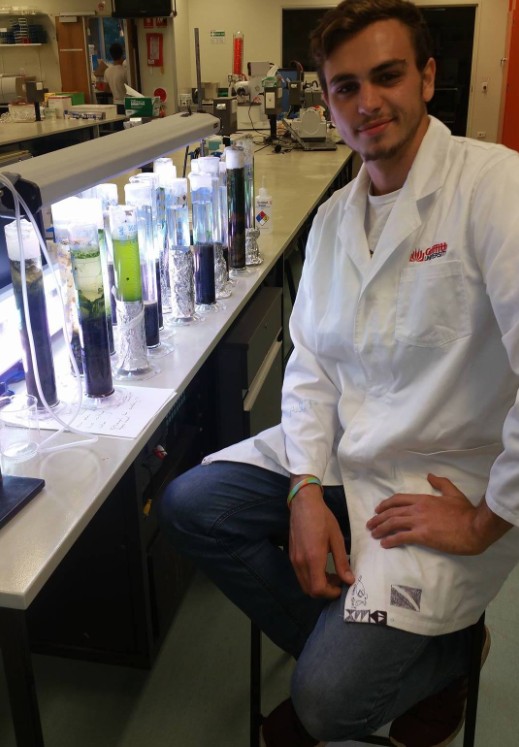 Congratulations to our runner up, Rahd Youakim, an aspiring second year student, Studying Marine science and majoring in Coastal Physical sciences at Griffith University.
Congratulations to our runner up, Rahd Youakim, an aspiring second year student, Studying Marine science and majoring in Coastal Physical sciences at Griffith University.
Rahd is an active conservationist. His career goal is to be one of the leading figures in Australia for sustainable fishing aquaculture practices. He plans to establish his own research groups, one in each state along the east coast of Australia exploring different temporal environments and maximising the yield production for each zone with minimal to zero impact.
“A big dream yes I know! But my mum once told me that we are always destined to be the best person we can be and showed me the way to inner-happiness is to give more than you take”.
“All I want ultimately is the world’s oceans to be as healthy as they were 200 years ago. When all this comes together in the next 20 years I hope to use mine and others expertise re-stock the oceans with species that are on the brink of extinction”.
Rahd plans to use his award to contribute to his tuition costs which will assist with achieving his career goals and implementing his ideas in the future. He plans to purchase an aquaculture/ aquaponics system which will consist of a 2ft, 3ft and 4ft fish tank with filters, heaters etc. With the skills and knowledge gained from his studies, he would like to conduct his own experiments so that he can one day present his findings for every type of environment and implement these to ensure the best sustainable practices.
We would like to thank all those that participated. The next Encouragement Award will be posted on our website soon.
For more information or to stay informed of other upcoming promotions please ‘Like us” on Facebook or contact us.
Contact us



 02 9541 3500
02 9541 3500